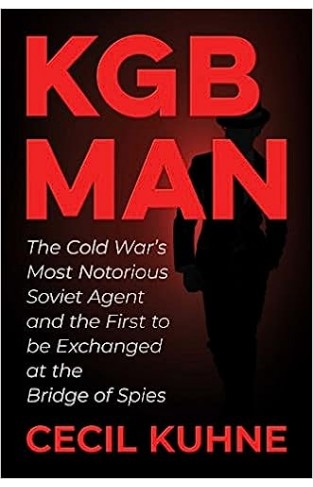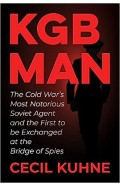- Home
- European
- KGB Man - The Cold War's Most Notorious Soviet Agent and the First to be Exchanged at the Bridge of Spies
KGB Man - The Cold War's Most Notorious Soviet Agent and the First to be Exchanged at the Bridge of Spies
By: Cecil Kuhne
-
Rs 5,605.75
- Rs 6,595.00
- 15%
You save Rs 989.25.
Due to constant currency fluctuation, prices are subject to change with or without notice.
Rudolf Ivanovich Abel ran KGB operations in the United States for nine years during the Cold War of the 1950s, until one day his true identity was revealed by a lazy, hard-drinking, womanizing colleague who decided to defect to the United States before he was sent back to Russia—and presumably his death—for incompetence in the field.
As the authorities hunted down Abel, the FBI had in hand his tools of trade—hollowed-out bolts and coins used to send tiny coded messages and photographs back and forth to the Soviet Union—but little else in the way of hard leads. After Abel was located, his modest hotel in Manhattan was staked out by the FBI for over a month before he was eventually arrested and tried for espionage.
After his conviction, Abel appealed his case to the Second Court of Appeals, where he argued that the search and seizure of his hotel room was unconstitutional because they were made without a warrant. His conviction was affirmed, and the case proceeded to the Supreme Court, which was sharply divided.
The cliffhanger facing Abel for the next several years was whether he would face the electric chair, remain in prison for the rest of his life, or be exchanged for an American spy held by the Russians. His fate remained in the balance.
Rudolf Ivanovich Abel ran KGB operations in the United States for nine years during the Cold War of the 1950s, until one day his true identity was revealed by a lazy, hard-drinking, womanizing colleague who decided to defect to the United States before he was sent back to Russia—and presumably his death—for incompetence in the field.
As the authorities hunted down Abel, the FBI had in hand his tools of trade—hollowed-out bolts and coins used to send tiny coded messages and photographs back and forth to the Soviet Union—but little else in the way of hard leads. After Abel was located, his modest hotel in Manhattan was staked out by the FBI for over a month before he was eventually arrested and tried for espionage.
After his conviction, Abel appealed his case to the Second Court of Appeals, where he argued that the search and seizure of his hotel room was unconstitutional because they were made without a warrant. His conviction was affirmed, and the case proceeded to the Supreme Court, which was sharply divided.
The cliffhanger facing Abel for the next several years was whether he would face the electric chair, remain in prison for the rest of his life, or be exchanged for an American spy held by the Russians. His fate remained in the balance.
KGB Man - The Cold War's Most Notorious Soviet Agent and the First to be Exchanged at the Bridge of Spies
By: Cecil Kuhne
Rs 5,605.75 Rs 6,595.00 Ex Tax :Rs 5,605.75
Zubin Mehta: A Musical Journey (An Authorized Biography)
By: VOID - Bakhtiar K. Dadabhoy
Rs 892.50 Rs 1,050.00 Ex Tax :Rs 892.50
Scooby-Doo! Colouring & Activity Placements
By: Alligator Books
Rs 845.75 Rs 995.00 Ex Tax :Rs 845.75
SINISTER SPRING: Murder and Mystery from the Queen of Crime
By: Agatha Christie
Rs 2,800.75 Rs 3,295.00 Ex Tax :Rs 2,800.75
The Origins of Political Order From Prehuman Times to the French RevolutioN
By: Francis Fukuyama
Rs 4,045.50 Rs 4,495.00 Ex Tax :Rs 4,045.50
Manning Up: How the Rise of Women Has Turned Men into Boys
By: Kay Hymowitz
Rs 845.75 Rs 995.00 Ex Tax :Rs 845.75
The Obama Syndrome: Surrender At Home War Abroad
By: Tariq Ali
Rs 1,100.75 Rs 1,295.00 Ex Tax :Rs 1,100.75
The Quest For Meaning: Developing A Philosophy Of Pluralism
By: Tariq Ramadan
Rs 1,185.75 Rs 1,395.00 Ex Tax :Rs 1,185.75
The Pakistan US Conundrum Jihadists The Military And The People The Struggle For Control
By: Yunas Samad
Rs 1,185.75 Rs 1,395.00 Ex Tax :Rs 1,185.75
An Enemy We Created: The Myth Of The Taliban Al Qaeda Merger In Afghanistan 19702010
By: Alex Strick van Linschoten
Rs 4,197.50 Rs 8,395.00 Ex Tax :Rs 4,197.50
WikiLeaks: Inside Julian Assanges War on Secrecy
By: David Leigh & Luke Harding
Rs 637.50 Rs 850.00 Ex Tax :Rs 637.50
Scooby-Doo! Colouring & Activity Placements
By: Alligator Books
Rs 845.75 Rs 995.00 Ex Tax :Rs 845.75
SINISTER SPRING: Murder and Mystery from the Queen of Crime
By: Agatha Christie
Rs 2,800.75 Rs 3,295.00 Ex Tax :Rs 2,800.75
No recently viewed books available at the moment.
Zubin Mehta: A Musical Journey (An Authorized Biography)
By: VOID - Bakhtiar K. Dadabhoy
Rs 892.50 Rs 1,050.00 Ex Tax :Rs 892.50
KGB Man - The Cold War's Most Notorious Soviet Agent and the First to be Exchanged at the Bridge of Spies
By: Cecil Kuhne
Rs 5,605.75 Rs 6,595.00 Ex Tax :Rs 5,605.75
Scooby-Doo! Colouring & Activity Placements
By: Alligator Books
Rs 845.75 Rs 995.00 Ex Tax :Rs 845.75
SINISTER SPRING: Murder and Mystery from the Queen of Crime
By: Agatha Christie
Rs 2,800.75 Rs 3,295.00 Ex Tax :Rs 2,800.75














-120x187.jpg?q6)









-120x187.jpg?q6)



-120x187.jpg?q6)



